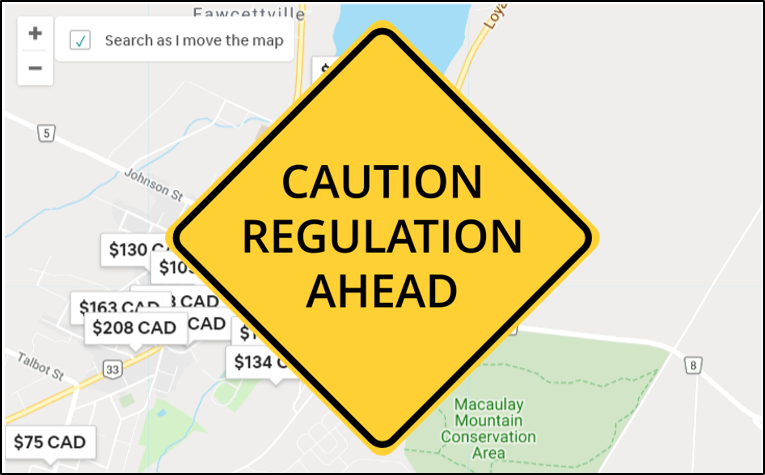Buyers considering using a property as an airbnb rental should have a viable “Plan B” based on long-term rental.
Update: As the result of a municipal council decision on October 9th 2018, Prince Edward County will regulate short term rentals like Airbnb’s. The regulations will grandfather existing rentals, but freeze the number of rentals in popular areas like Wellington and Picton. Read update here
On September 7th, after a year of public discussion, municipal staff released a proposal for comprehensive airbnb regulations for Prince Edward County. If approved, the regulations will significantly change short-term rental business in the County.

Background
The number of airbnb’s and other short-term rentals in Prince Edward County has grown explosively of the last three years. Starting from a base of 330 in 2016, the number of short-term rental properties in the County is now estimated at over 1,000. In other words, nearly 10% of the dwellings in the County are being used as airbnb’s.
As a result, short-term rentals have become a focal point for political debate.
Key Provisions
The new staff recommendations have three key provisions.
The municipality’s zoning by-law would be amended to allow short-term rentals in specific zones. Under the current zoning by-law, airbnb’s are not a property permitted use in the County.
Under the new system, airbnb’s will have to obtain a license, where both extent of the regulations and and the license fees increase with number of bedrooms. Some people have already suggested that the license fees could be used to address the affordable housing problem.
Finally, the new regulations would address the concern about community erosion by limiting the density of airbnb’s in the areas where they are permitted. Where there are too many airbnb’s to meet the density regulations, the owners of currently-operating airbnb’s will be grandfathered so that they can continue to operate.
Properties Not Grandfathered
However, under the proposed regulations, the owner is grandfathered and not the property. When the property sells, the new owner will not get a license to operate if there are already too many short-term rentals in the neighborhood. Density targets in neighborhoods with too many short-term rentals will be achieved over time as properties change hands.
Council has scheduled a special public meeting for September 10th to get citizens’ feedback on the draft regulations. Afterwards, the regulations will come back to Council for approval or amendment.
Implications Of Airbnb Regulations For Prince Edward County
The proposals have not become by-law yet. However, there are several implications for buyers of the proposed airbnb regulations for Prince Edward County.
- Potential buyers need to be aware that operating an airbnb is not an allowable use under the County’s current zoning by-law, except where the owner lives on site.
- Second, costs will increase due to licensing fees and compliance issues if the regulations are passed,
- In popular neighbourhoods, they may not be able to get a license to operate if the density of existing short-term rentals has been exceeded.
Anyone considering buying a property for an airbnb for a rental business should have a viable “Plan B” based on long-term rental.
NOTE: The staff report on the proposed regulations for short-term accommodation can be found at https://princeedwardcounty.civicweb.net/filepro/documents/144606?preview=158012 under Agenda item 4.1. The Presentation for this item presents a good overview of the proposed approach. The other document, Report & Supporting Documentation, contains detailed information, particularly the consulting report which starts on page 107.
Top image credit: Diane Labombarbe
Treat Hull spent three decades as a management consultant and marketing executive before moving to the County and taking up real estate. He is broker/owner of Treat Hull & Associates Ltd., a Prince Edward County brokerage which takes no listings and represents only buyers.



